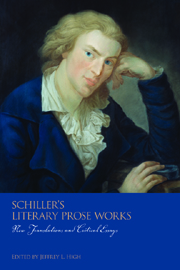Book contents
- Frontmatter
- Contents
- Foreword
- Preface
- Acknowledgments
- Notes on the Translations
- Introduction: Schiller and the German Novella
- The Translations
- 1 A Magnanimous Act from Most Recent History (1782)
- 2 A Remarkable Example of Female Revenge (Taken from a Manuscript by the late Denis Diderot) (1785)
- 3 The Criminal of Lost Honor. A True Story (1786)
- 4 The Duke of Alba's Breakfast at Rudolstadt Castle in the Year 1547 (1788)
- 5 Game of Fate. A Fragment of a True Story (1789)
- 6 The Spiritualist. From the Memoirs of Count von O** (1789)
- 7 The Philosophical Dialog from The Spiritualist (1789)
- 8 Haoh-Kiöh-Tschuen (The Tale of a Perfect Match) (1800–1801)
- The Critical Essays
- Chronological List of Schiller's Literary Prose Works in English Translation
- Works Cited
- Notes on the Contributors
- Index
1 - A Magnanimous Act from Most Recent History (1782)
from The Translations
Published online by Cambridge University Press: 05 February 2013
- Frontmatter
- Contents
- Foreword
- Preface
- Acknowledgments
- Notes on the Translations
- Introduction: Schiller and the German Novella
- The Translations
- 1 A Magnanimous Act from Most Recent History (1782)
- 2 A Remarkable Example of Female Revenge (Taken from a Manuscript by the late Denis Diderot) (1785)
- 3 The Criminal of Lost Honor. A True Story (1786)
- 4 The Duke of Alba's Breakfast at Rudolstadt Castle in the Year 1547 (1788)
- 5 Game of Fate. A Fragment of a True Story (1789)
- 6 The Spiritualist. From the Memoirs of Count von O** (1789)
- 7 The Philosophical Dialog from The Spiritualist (1789)
- 8 Haoh-Kiöh-Tschuen (The Tale of a Perfect Match) (1800–1801)
- The Critical Essays
- Chronological List of Schiller's Literary Prose Works in English Translation
- Works Cited
- Notes on the Contributors
- Index
Summary
PLAYS AND NOVELS REVEAL TO us the brightest attributes of the human heart; our imagination is ignited, our heart remains cold; at the very most, the fire, to which the heart is moved through these means, is merely fleeting, and soon grows too cold to be of any consequence in real life. At that same moment, just when the unadorned kindheartedness of a sincere novel character like Puff nearly stirs us to tears, we can still impulsively shout down the knock of a needy beggar at the door. Who can say whether this same artificial existence in an idealistic world might not undermine our existence in the real one? We hover here, as it were, around the two poles of morality, angel and devil, and we leave the middle — humanity — lying in the breach.
The present anecdote of two Germans — which I am both proud and happy to write — has an indisputable merit: It is true. I hope that it will leave my readers warmer than all of Richardson's novels about Grandison and Pamela.
Two brothers, the Barons of Wrmb., had both fallen in love with the young, in-every-way-exemplary Lady of Wrthr., without the one knowing about the other's passion. For both, love was strong and vulnerable, because it was their first. The young woman was beautiful and destined to sensitivity and sensibility. Both allowed their attraction to develop into a consuming passion, because neither one could recognize the peril in store, the worst a heart can suffer: to have his brother as a romantic rival.
- Type
- Chapter
- Information
- Schiller's Literary Prose WorksNew Translations and Critical Essays, pp. 9 - 11Publisher: Boydell & BrewerPrint publication year: 2008



